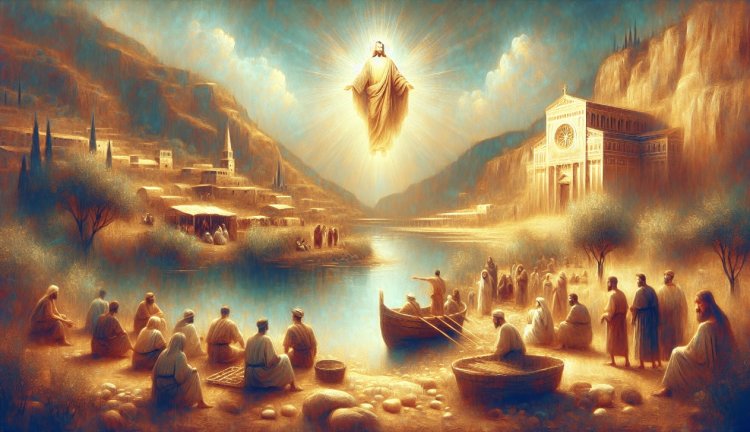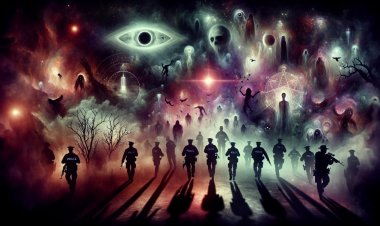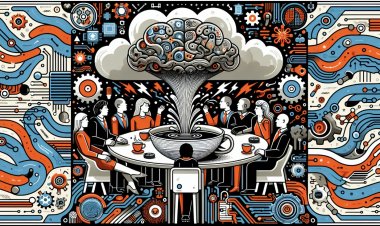The History of Catholicism: From Jesus Christ to the Roman Empire
Unravel the captivating story of Catholicism! From Jesus' teachings to the rise and fall of the Roman Empire, explore the fascinating historical journey of this global faith. Witness its evolution, conflicts, triumphs, and enduring impact on the world.

Introduction
The Catholic Church is a really old institution that has been around for almost 2,000 years. It has a really interesting history. Some people who study religion and history disagree with the Catholic Church's belief that it is connected to the early days of Christianity. This has led to a debate about where Catholicism really comes from. In this blog, we will learn about the history of Catholicism, starting with Jesus Christ and going all the way to the Roman Empire.
Perceived Beginning with Jesus Christ
According to the Catholic tradition, Catholicism started with Jesus Christ, who is believed to be the Messiah. Jesus, who was both God and a human, brought together a bunch of followers and shared his groundbreaking ideas with them. He took Jewish beliefs and made them bigger and more meaningful. Jesus did important things for about three years that really changed Christianity.
Dispute Regarding the Foundation
Some historians believe that Constantine started the Roman Catholic Church in the 4th century, but Catholics believe that Jesus Christ himself founded their church. This way of thinking believes that there isn't a direct connection from the apostles to the Pope. It also suggests that there was a period of decline called the "Great Apostasy" in the early years of Christianity. This argument makes it difficult to figure out the exact date when the Catholic faith started.
Even though there was disagreement, it's important to mention that the Roman emperors, especially Constantine, started following Christianity. This decision made the Catholic Church a prominent and powerfully organized institution. The Edict of Milan was a really important event for the church. It happened in 313, and it gave Christians the right to practice their religion without any problems.
Jesus Christ: The Messiah
Jesus Christ, who is believed to be the Saviour, holds a central place in the Catholic religion. People believe that he has both a divine and human nature, which means he is considered to be the perfect man and the ideal of virtue and piety.
Jesus was born in Bethlehem, Judea when Caesar Augustus was ruling. We don't know much about Jesus' childhood, but when he was about thirty years old, he started his public mission. He was baptized by John the Baptist and became known as the Messiah.
Jesus traveled around Palestine for approximately three years, teaching with great power and authority. He based his teachings on Jewish beliefs but added to them and gave them a different interpretation.
Jesus chose twelve apostles during his time of teaching and helping others. These apostles were regular people, such as fishermen and workers in the fields. He also had seventy non-Jewish disciples who did not follow the Jewish religion.
Jesus taught about love, peace, and compassion. He paid attention to people who were born into lower social classes—those who committed sins, stole things, and betrayed others. He didn't talk to rich and important people, but instead, he connected with regular folks.
The things he taught and did had a big effect on how the Christian religion grew. The Evangelists—a group of four people—wrote the Gospels. They tell us about Jesus's life and what he taught. The purpose of these stories was not to be historically accurate, but instead to show that he was divine.
Jesus's mission reached its peak when he entered the city of Jerusalem. People saw him as someone who stirred up both political and religious discussions. Even though he was eventually caught and crucified, Christianity kept growing, and by the end of the 1st century, it had become a popular religion.
Although there is some debate over the precise start date of the Catholic faith, Catholics hold that Jesus Christ founded their church on his own. The choice of Peter as the foundation of the Catholic Church and the following line of popes make this belief even stronger.
In Catholicism, Jesus Christ is very important. His teachings and the way he lived his life are like a roadmap for Catholics all over the world. The Catholic Church still follows and believes in his message of love and compassion.
The Gospels and the Formation of the Christian Faith
The Gospels were very important in forming the Christian religion. Four people by the names of Matthew, Mark, Luke, and John wrote these texts. They give us information about the life and teachings of Jesus Christ. The Gospels were not meant to be historically accurate, but they were written to show that Jesus is divine.
The Gospels were not just trying to give a straightforward and factual story about Jesus. They wanted to convince people of how important Jesus was. The stories and teachings of early Christian communities were passed down through spoken tradition based on their shared memories.
In the first few decades after Jesus died, the early Christians considered themselves to be a part of Judaism. They saw Jesus as the Messiah they had been waiting for, who fulfilled the prophecies in the Hebrew Scriptures. But it was the idea of coming back to life that made their religious beliefs feel more meaningful and clear.
In Judaism, people were familiar with the concept of the resurrection. However, early Christians saw Jesus's resurrection as proof that he was truly the Son of God. It was a significant moment when Christianity started to become its own separate religion, distinct from Judaism.
When Christianity started to become more popular, there were some Jewish leaders who didn't believe that Jesus was the Messiah they had been waiting for. They didn't accept his teachings and opposed the spread of Christianity. However, the early Christians stayed connected to the Jewish faith. They continued to faithfully go to the temple and follow the laws of Judaism.
However, when non-Jews (Gentiles) became part of the Christian community, it caused some important changes. The apostle Paul was really important in spreading Christianity to more people and making it attractive to those who weren't Jewish.
Paul made it clear that believing in Jesus was sufficient for salvation and that his followers didn't have to follow all the Jewish laws. This caused arguments among the early Christian groups, so they had a meeting called the Council of Jerusalem in 50 CE. They were able to find a solution that everyone agreed on.
Christianity started to spread to places outside of Jewish communities, like Antioch and became popular among non-Jewish people. When Gentiles started becoming Christians, it was a big moment that changed how the Christian faith grew and developed.
As time passed, the Church of Rome became a well-known institution. It claimed authority because it was connected to Saints Peter and Paul. When Roman emperors, like Constantine, started following Christianity, it made the Catholic Church even more important and powerful.
Catholics think that Jesus Christ himself started their church, although the exact date is still uncertain. The choice of Peter as the foundation of the Catholic Church and the following line of popes support this idea.
The gospels were really important for the Christian faith. They helped shape what Christians believe, how they practice their religion, and the traditions they follow. The early Christian communities remembered things together; Christianity changed from being a part of Judaism; and the idea of coming back to life all helped make the Catholic Church.
Spread of Christianity and Paul's Influence
During the early years of Christianity, the faith slowly spread and mainly reached Jewish communities living near the Mediterranean Sea. When the apostles started to worry about being persecuted in Jerusalem, they started sharing their teachings in other countries. This helped Christianity spread and reach more people over time.
A really important moment in the spread of Christianity happened in a city called Antioch. Antioch used to be an old Greek city and is now located in Turkey. Antioch played a big role in spreading the Christian faith to non-Jewish people. This was a really important moment in the growth of Christianity.
During the time when Christianity was just starting out, there were some important people who had a big impact. One of these people was the apostle Paul. He played a very important role in spreading Christianity to more people and making it more attractive to those who were not Jewish. Paul, who wrote fourteen out of the twenty-seven books in the New Testament, believed that having faith in Jesus was sufficient for salvation. He also taught that followers didn't have to follow all the Jewish laws.
Paul's teachings made the Gospels more appealing to a larger group of people by removing their specific Jewish elements. Many non-Jews who wanted a religion that didn't have strict Jewish laws found his message appealing.
Paul's teachings caused arguments among the first Christian groups, which eventually led to the Council of Jerusalem in 50 CE. The council wanted to solve the problem of whether or not Gentiles should be allowed in the Christian community. A compromise was made that allowed Gentile followers to not follow certain Jewish laws, but they still had to follow some others.
Because of Paul's teachings and the acceptance of Gentiles, Christianity started to grow and spread to more people outside of Jewish communities. When non-Jewish people started to become Christians, it was a really important moment for the growth and progress of the Christian religion.
As time went on, the Church of Rome became a well-known institution. It claimed authority because it was connected to Saints Peter and Paul. When Roman emperors, like Constantine, started following Christianity, it made the Catholic Church even more important and powerful.
Catholics believe that Jesus Christ himself started their church, although the exact date is still uncertain. The choice of Peter as the foundation of the Catholic Church and the following line of popes support this idea.
The Council of Jerusalem and Peter's Preeminence
The Council of Jerusalem was a meeting that happened in 50 CE and was really important for the early Christian community. The council's main aim was to discuss how to include non-Jews (Gentiles) in the Christian faith. Peter expressed his conviction that Jesus' grace could save both Jews and non-Jews during the council meeting. He expressed a positive outlook on Gentiles, emphasizing that salvation was available to everyone, regardless of their background. This perspective had a big impact on how Christianity developed in the future.
Peter's positive opinion of non-Jewish people greatly influenced the growth of the Catholic Church. Jesus gave Peter a special position of importance, making him the foundation of the Catholic Church. The following line of popes, going all the way back to Peter, made people believe this even more. The bishop of Rome, also called the Pope, is believed to be the person who follows in the footsteps of Peter, one of the apostles.
At the Council of Jerusalem, they made a deal about not making Gentiles follow all the Jewish laws. Even though Gentile followers were allowed to not follow some laws, they still had to follow others. People had different opinions about this decision. Some traditionalists agreed with it, while others disagreed.
When non-Jewish people started joining the Christian community, it made a big difference in how Christianity spread and grew. It spread to non-Jewish communities too, and many people in places like Antioch started to follow it. When Gentiles started becoming Christians, it was a big moment in the growth of the Christian religion.
As time passed, the Church of Rome became a well-known institution. It claimed authority because it believed it was connected to Saints Peter and Paul. When Roman emperors, like Constantine, started following Christianity, it made the Catholic Church more important and powerful.
Although there is debate over the exact date of its founding, Catholics believe that Jesus Christ founded their church. The belief that the Catholic Church was directly founded can be attributed to three main factors: the Council of Jerusalem, Peter's acceptance of Gentiles, and the line of popes that followed.
Rise of the Roman Catholic Church
The Roman Catholic Church, one of the oldest institutions in the world, has a fascinating history that dates back almost 2,000 years. In this section, we will explore the rise of the Roman Catholic Church, looking at key events and figures that shaped its development.
Persecution of Christianity and Paul's Arrest
In the early years of Christianity, followers of the faith faced persecution, especially from the Roman Empire. Roman authorities detained the apostle Paul, one of the most significant figures in the Apostolic Age, for promoting Christian teachings. Despite this persecution, the message of Christianity continued to spread, reaching Jewish and Gentile communities.
Constantine's Role in the Rise of the Roman Catholic Church
A really important time in the growth of the Roman Catholic Church was when Emperor Constantine was in charge. Constantine had a big part in making Christianity legal and promoting religious acceptance with the Edict of Milan in 313. This important event allowed Christians to openly follow their religion, which helped the Catholic Church become bigger and more influential.
Constantine's Conversion to Christianity
Constantine's becoming a Christian is another important moment in the Roman Catholic Church's growth. According to a long-standing belief, Constantine saw a vision of a cross in the sky along with the words, "You will be victorious under this symbol." Constantine was inspired by this vision, and he decided to follow Christianity and support the faith. When he converted, it greatly affected the relationship between the Roman Empire and the Catholic Church.
The First Council of Nicaea and its Impact
In the year 325, Constantine organized a meeting called the First Council of Nicaea. This gathering included more than two hundred bishops from different parts of the empire. The purpose of this council was to settle arguments about religion and come to an agreement on what Christians should believe. Constantine was personally interested in the discussions and actively participated in them. Even after he died, people kept discussing the topic. The First Council of Nicaea was important because it set the groundwork for future meetings and influenced how the Roman Catholic Church grew.
The Roman Catholic Church grew because of a mix of things, like events from the past, people being treated badly because of their religion, and important individuals like Paul and Constantine. These things helped the Catholic Church become a big and important organization in the Roman Empire and other places.
Debate on the Origins of Catholicism
People are currently arguing about where Catholicism came from. Different people have different ideas about it. Some people who are not Catholic theologians and historians argue that Jesus Christ did not directly establish their church, but Catholics believe that he did.
Catholics strongly believe that the basis of Catholicism is Jesus Christ, who is considered the Messiah. In their tradition, Jesus brought together a bunch of followers and shared his groundbreaking ideas with them. He took Jewish beliefs and made them bigger and more meaningful. The choice of Peter as the foundation of the Catholic Church and the following line of popes make this belief even stronger.
However, some historians argue that Constantine established the Roman Catholic Church in the 4th century. This way of thinking believes that there isn't a direct connection between the apostles and the Pope and that a period of decline called the "Great Apostasy" happened in the early years of Christianity. This argument makes it difficult to figure out the exact date when the Catholic faith started.
Even though there is some disagreement about where it came from, the Roman emperors, especially Constantine, started following Christianity. This caused the Catholic Church to become very important and powerful. The Edict of Milan was a very important event in the history of the church. It happened in 313, and it gave Christians the right to practice their religion without any problems.
Even though people have different opinions, Catholics believe it's important to keep old beliefs, rules, and customs to maintain the true essence of their faith. They get their inspiration from the olden times and the customs of long ago.
To sum it up, people still argue about where Catholicism came from. Catholics think that Jesus Christ started their church, but some people believe that Catholicism developed as a branch between the first and fourth centuries. The Catholic Church became important and grew because people kept following old beliefs and customs and also because Roman emperors started believing in Christianity.
Conclusion
Looking back at the history of Catholicism, we can see that the Catholic Church has a long and intricate history that goes back almost 2,000 years, starting from Jesus Christ's time to the Roman Empire. Some people who are not Catholic and study theology and history do not agree with the Catholic belief that Jesus Christ personally established their church. However, this topic is still being discussed and argued about. There are people who say that Constantine started the Roman Catholic Church in the 4th century.
Even though people are still arguing about it, it's important to remember that the Roman emperors, especially Constantine, started following Christianity. This made the Catholic Church important and powerful. The Edict of Milan in 313 was a really important moment for the church. It gave Christians the right to practice their religion without any problems.
If you want to learn more about the history of Catholicism, I suggest reading the book 'Catholic History: A Captivating Guide'. This book is really interesting and informative. It talks about the history of the Catholic Church, starting from when Jesus Christ taught his followers all the way to the present day, including the time of the Roman Empire and the Middle Ages. You can find it in different forms, like e-books, paperbacks, and audiobooks.
To sum it up, people still argue about where Catholicism came from. Catholics think that Jesus Christ started their church, but some people believe that Catholicism developed as a branch between the first and fourth centuries. The Catholic Church became important and grew because people kept following old beliefs and traditions and also because Roman emperors started believing in Christianity.
If you're interested in learning more about the origins of Catholicism and delving into its history, I recommend checking out 'Catholic History: A Captivating Guide.' It's a fantastic resource that will help you explore the subject in depth. Get a book and start an interesting adventure through the past of the Catholic Church.



 admin
admin 










